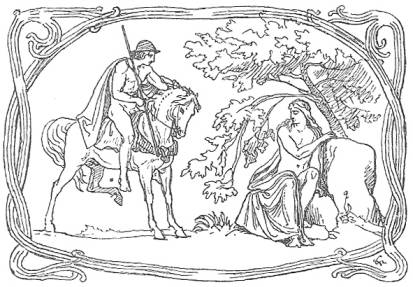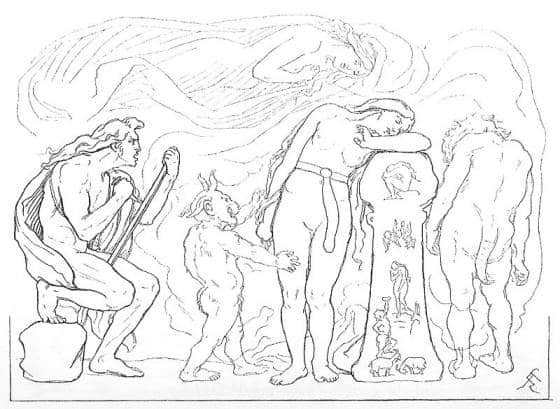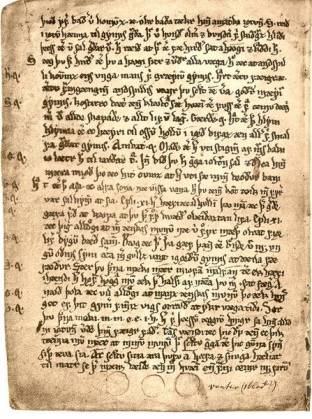The Lay of Skirnir (Old Norse Skírnismál) is the fifth poem in the Poetic Edda and both an interesting as well as entertaining read. In it, we learn how Freyr falls madly in love with the jötun Gerdr. Then, in order to secure her hand in marriage, sends the servant Skirnir to Jotunheim to woo her.
In the love story of the Vanir god Freyr and the beautiful jötun Gerd, the servant Skirnir plays an important part. Without him, there would in fact be no Freyr and Gerd. On the other hand, Freyr would not have lost his famed sword which could fight on its own.
With the sword, maybe Freyr could defeat the fire giant Surtr when they meet at Ragnarok. However, Freyr readily gives up his sword to Skirnir and in the way, myths work, seems unable to replace it.
Going back to the story it gives an interesting view into the workings of the hero Freyr. The way Skirnir threatens Gerd in order to have her submit to Freyr would not have been received well today.
Back in the Viking Age, however, arranged marriages and bride-payments were the norm. As such, maybe the strangest thing in the plot of the poem is that Skirnir negotiates with Gerd directly. In reality, the young bride-to-be would likely have little to say, her father being the one to negotiate.
This subject of being promised a bride is a returning theme in several of the Norse myths. In Alvissmál for example, the dwarf Alvis comes to collect Thrud, daughter of Thor and Sif to be his bride. Sadly for Alvis that doesn’t work out quite as he had hoped. That is regardless of the fact he had made some kind of payment.
Comparisons with other poems in the Poetic Edda
The four poems preceding Skírnismál in the Poetic Edda are Voluspá, Hávamól, Vafthruthnirsmál and Grímnismál. Comparing them, they are distinctly different from Skirnismal as they are more driven by mythological facts. In them, the reader gets a wealth of insight into various facts of the Norse myths from beginning to end.
The Lay of Skirnir however is much more like Thrymskvida or Lokasenna in their colorful stories and vivid descriptions. Much like how Loki really lays into the other gods in Lokasenna, Skirnir paints a bleak picture for Gerd.
I am hard-pressed to say there is an underlying morale to the story. We do find some of the same themes reflected in Viking culture, however. That is especially clear in how Gerd is forced into the marriage, yet seems quick to accept her circumstances.
The below poem is based on an updated and slightly adapted version of the 1936 translation by Henry Adams Bellows. In some instances, I have leaned on the original Old Norse to get an adaptation more true to the source material.
The Lay of Skirnir
Freyr, son of Njord, was sitting one day in Hlidskjalf and looked over all the worlds. He looked into Jotunheim and saw a beautiful maiden leaving her father’s house. He immediately fell in love with her. Skirnir was Freyr’s servant, Njord ordered him to talk to Freyr. He said:
1. “Go now, Skirnir! and ask my son
what is troubling him so;
And get an answer, for he is
deeply in love.”
Skirnir said:
2. “I know I will face harsh words,
if I go to speak with him,
And get an answer, for he is
deeply in love.”
Skirnir said:
3. “Please tell me, Freyr,
foremost of the gods,
What is troubling you so?
Why are you sitting here alone
for so many days?”
Freyr said:
4. “How can I tell you,
young hero,
Of my great sorrow?
Though the sun rises every day,
it never brings relief to my longing.”
Skirnir said:
5. “I don’t think your longing is
too great to tell me,
Since we were young together,
we can trust each other.”
Freyr said:
6. “From Gymir’s house,
I saw a maiden,
She was dear to me,
her arms shone like the sea and sky.
7. “She is more dear to me than any
maiden has ever been to a man,
But no one among the gods or elves
will let us be together.”
Skirnir said:
8. “Then give me the horse that can
ride through the dark and flames,
And give me the sword that can
fight on its own against giants.”
Freyr said:
9. “I will give you the horse that can
ride through the dark and flames,
And the sword that can fight on its own,
if you are a worthy hero.”
Skirnir spoke to the horse:
10. “It’s dark out, and I think it’s time
to go through the wild,
(To go through the giants’ stronghold;)
We will both come back, or the
terrible giant will get us both.”
Skirnir rode into Jotunheim to Gymir’s house. There were fierce dogs guarding the gate of the fence around Gerd’s hall. He rode to where a herdsman sat on a hill and said:
11. “Tell me, herdsman, sitting on the hill,
watching all the paths,
How can I talk to the maiden
past Gymir’s hounds?”
The herdsman said:
12. “Are you doomed to die or already dead,
rider who came here?
You will never be able to talk
to Gymir’s daughter.”
Skirnir said:
13. “Being bold is better than
complaining for those who have to go,
My days are numbered, and my life’s
span has been set.”

Gerd said:
14. “What is that loud noise
I hear in my house?
The ground shakes, and Gymir’s
home trembles around me.”
The Serving-Maid spoke:
15. “There’s someone outside who’s dismounted his horse,
And set it free to graze.”
Gerd spoke:
16. “Tell the man to come in and drink some mead
Here in our hall;
Though I fear that the person outside
May be my brother’s killer.”
17. “Are you from the elves | or the offspring of gods,
Or from the wise Vanir?
How did you come alone | through the leaping flames
To see our home?”
Skirnir spoke:
18. “I am not from the elves, | nor the offspring of gods,
Nor from the wise Vanir;
Though I came alone | through the leaping flames
To see your home.”
19. “Eleven apples, | all made of gold,
I will give you, Gerd,
In exchange for your promise | that Freyr will be
Considered your dearest.”
Gerd spoke:
20. “I will not take | any man’s gifts
These eleven apples ever;
Nor will Freyr and I | find a shared home
For as long as we live.”
Skirnir spoke:
21. “Then I bring you | the ring that was burned
In the past with Odin’s son;
From it, eight rings | of equal weight fall
On every ninth night.”
Gerd spoke:
22. “I don’t want the ring, | even though it was burned
In the past with Odin’s son;
In Gymir’s home | there is no shortage of gold
With the wealth my father holds.”
Skirnir spoke:
23. “See, maiden, | this sharp, bright sword
That I hold in my hand?
I will chop off your head | from your neck
If you don’t do as I say.”

Gerd spoke:
24. “I will never suffer for anyone’s sake
To be moved by power;
But gladly, I think, Gymir will seek
To fight if he finds you here.”
Skirnir spoke:
25. “Do you see, maiden, this sharp, bright sword
That I hold in my hand?
The old giant will bend before its blade –
Your father is doomed to die.
26. “I strike you, maid, with my magic staff
To make you obey my will;
You will go where no human will ever see you again.
27. “On the eagle’s hill you will always sit
And look at the gates of Hel;
Your food will become more loathsome to you
Than a pale snake is to men.
28. “If you come out, Hrimnir will stand and stare at you in fear
(People will marvel at you);
You will become more famous than the watchman of the gods!
Come out of your prison, then,
29. “Rage and longing, chains and wrath,
Tears and torment will be yours;
Wherever you sit, my doom will be upon you
With heavy heart
And double pain.
30. “In the giants’ home, vile things will harm you
Every day with evil deeds;
You will get grief instead of happiness,
And sorrow to suffer with tears.
31. “You will live forever with three-headed giants
Or never know a husband;
(Let longing grip you, let wasting waste you -)
You will be like the thistle
That was thrown into the loft and crushed there.
32. “I am going to the wood,
And to the wet forest,
To find a magic wand;
I have found a magic wand.
33. “Odin is angry, the best of the gods is angry,
Freyr will be your enemy,
Worst of maidens, who has earned
The magic wrath of the gods.
34. “Listen, rulers of frost, hear, giants,
Sons of Suttung,
And gods, too,
How I forbid and how I ban
The meeting of men with the maiden,
(The joy of men with the maiden.)
35. “Hrimgrimnir is he, the giant who will have you
In the depth by the doors of Hel;
To the frost-giants’ halls you will go every day,
Crawling and craving in vain,
(Crawling and having no hope.)
36. “There, base creatures by the root of the tree
Will give you horns of filth to drink;
You will never find a fairer drink,
Maiden, to meet your desire,
(Maiden, to meet my desire.)
37. “I am writing you a charm and three runes with it,
Longing and madness and lust;
But what I have written I may yet erase
If I find a need for it.”
Gerd spoke:
38. “Accept this welcome instead,
And take the frost-cup filled with mead;
Though I never believed that I would love
Anyone of the Wanes.”
Skirnir spoke:
39. “I must learn all my news
Before I ride home:
How soon will you meet
With the powerful son of Njord.”
Gerd spoke:
40. “There is a forest, Barri, that we both know well,
A fair and peaceful place;
And in nine nights from now, to Njord’s son,
Gerd will grant pleasure there.”
Then Skirnir rode home. Freyr stood outside and spoke to him, asking for news:
41. “Tell me, Skirnir, before you take off your saddle,
Or take another step:
What have you done in the giant’s home
To make you or me happy?”
Skirnir spoke:
42. “There is a forest, Barri, that we both know well,
A fair and peaceful place;
And in nine nights from now, to Njord’s son,
Gerd will grant pleasure there.”
Freyr spoke:
43. “One night is long, two nights are even longer;
How can I bear three?
Often a month seems shorter to me
Than half a night of desire now.”
Thoughts on the Poem
The Skírnismál is one of my personal favorites among the many Norse poems. It’s not long, but reading between the lines you learn a lot about the culture and values of the old Norse. Skirnir moves fairly swiftly from bearing gifts trying to woo Gerdr, to the worst threats imaginable. Actually, if you read the original in Old Norse, its content is even more graphic.
Another thing I find interesting is what is “left out” of the story, how come Freyr just happened to have access to, and sit on Odin’s high seat Hlidskjalf? And, why did he have Draupnir to give away in the first place? It must have been very prercious to Odin, after he got it back from Baldur brom beyond the gate of Hel.
When reading the Norse myths, you often come across references, or like here, seemingly missing information. The only thing we know for sure is that some of the stories form the Viking Age are lost. It makes the ones we still have even more valuable I think.
Featured Image Credit: W.G. Collingwood (1854 – 1932), Public domain, via Wikimedia Commons


Odin the Allfather | Ruler of the Norse gods
And, creator and ruler of the human world, let’s not forget 😉